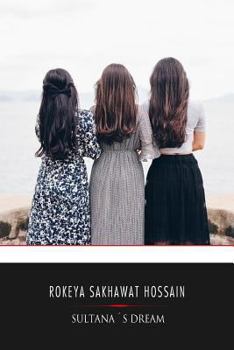Sultana's Dream
Select Format
Select Condition 
Book Overview
Sultana's Dream by Rokheya Shekhawat Hossein. The female narrator of Sultana's Dream wanders into a dream city that shuns war and violence. In this utopian world, women rule and men are content with... This description may be from another edition of this product.
Format:Paperback
Language:English
ISBN:1545203458
ISBN13:9781545203453
Release Date:April 2017
Publisher:Createspace Independent Publishing Platform
Length:26 Pages
Weight:0.11 lbs.
Dimensions:0.1" x 6.0" x 9.0"
Related Subjects
Asia Contemporary Fiction India Literature & Fiction Politics & Social Sciences Women's StudiesCustomer Reviews
4 ratings
Still Relevant
Published by Thriftbooks.com User , 15 years ago
A delightful tale that reverses the role of men and women. For me the most significant part of this fantasy centers around women's behavior in this utopian society. Far from running amok, the absence of men merely means more time for the pursuit of arts, science and gardening. A far different picture than is painted by patriarchal religious leaders around the world. This book is a must read because far from being in decline, purdah and variants of purdah (the segregation of men and women, spiritually, socially and eventually legally) is on the rise. It's noxious seeds can be found wherever and when ever men talk about "woman's place". Just one of the debilitating effects of purdah in a democratic society is the belief of the woman that she is not accountable for the character of her community. An issue this book addresses clearly. Buy it!~ In fact, buy several and pass them around. Share it with everyone, friends, sisters, daughters, ministers, teachers, legislators.
Powerful Stuff
Published by Thriftbooks.com User , 16 years ago
If you are at all interested in Feminism then you must read this book. Discusses Purdah and the utopia dream of Hossain.
Primarily non-fiction
Published by Thriftbooks.com User , 21 years ago
Purdah, or the seclusion of a group of people from the rest of the world, is a practice still alive and well in several parts of the world. While it may not be very common in India at the beginning of the twenty-first century, it was quite common during the first half of the twentieth. This book presents short story "Sultana's Dream" and the recollections of women living under purdah complied by Rokeya Sakhawat Hossain. There is also an introduction to each work and an analysis of Hossain's life and writing by Roushan Jahan interspersed between each piece. In other words, there are four individual essays and one short story in this collection. It could be difficult for women today who do not live in purdah to understand but it is important to remember our collective past and realise similar things are happening today.
Purdah.... a complex issue
Published by Thriftbooks.com User , 23 years ago
This little book was more than just an extraordinary short story written by a woman in 1905 who examined and questioned purdah by turning the issue into a humorous "dream" sequence (in a place where the men are in purdah!) - it is also a compilation of other materials in the examination of what purdah is and means. Relatively unknown and not understood in the West, "purdah" ("parda" in Hindi, meaning 'curtain') is the seclusion and segregation of women (even from other women, not of the family) and is a tradition that is thrust upon women of many Middle Eastern and Asian societies. In the West we confusedly belief it is only Muslim when in fact other religions undertake it as well.Rokeya Hossain wrote Sultana's Dream at the urging of her husband who was quite forward-thinking (for an Asian male in the early part of the last century!) and who believed that by writing, she would be able to perfect her English skills. The Dream is brilliantly simple and clearly written. The idea that a woman in purdah should suddenly find herself in a place where it is the men in the society who are hidden away and where life is peaceful and intellectual thought and political balance are the norm (as a result of not having the men out messing things up), is a delight even to a contemporary Western reader.The second section of this book is a section complied by Roushan Jahan in which Hossain's writing about purdah (from a book called "The Secluded Ones") is reproduced in the form of various 'reports' all of which demonstrate something fundamentally absurb or violent about being in purdah. The third section is a piece by a Western woman named Hanna Papanek who examines how much more complicated purdah is than just a means by which men in a given society control and suppress women. That definition is certainly valid, but Papanek also examines a case where a woman raised in purdah finds "exposure" (after a life of purdah) to be fraught with fear and discomfort.In all, a fascinating and in a strange sense appalling cultural phenomena that is basically unknown to the West, purdah is handed here to the reader in a way that makes it possible to examine it without generating the viseral anger that the idea raises in most educated women. I am strongly inclined to study the issue further and to find "The Secluded Ones" - once I feel strong enough not to let it infuriate me!





